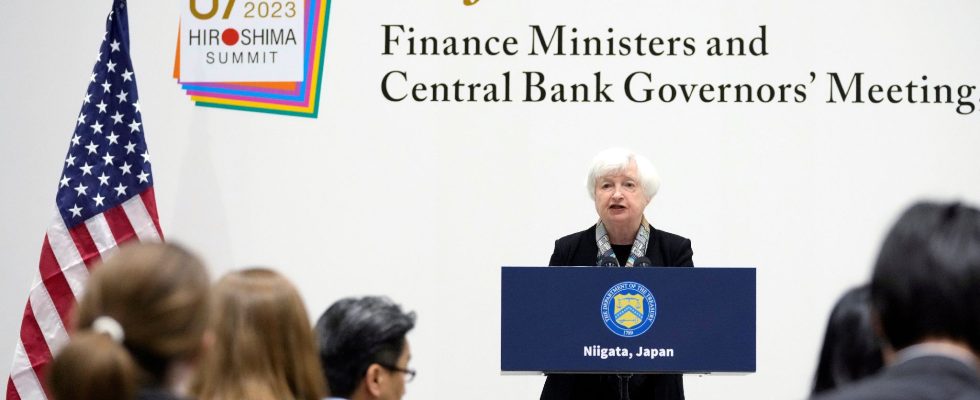The United States could be in default as soon as June 1, without an agreement to raise the debt ceiling. The government is considering several solutions to avoid such a scenario. Among them: the use of the controversial 14th Amendment.
Added to the American Constitution after the Civil War, in 1868, article 4 of this amendment stipulates that “the validity of the public debt of the United States, authorized by law, must not be questioned”. In other words: the expenditure already voted must be able to be honored, whether the debt ceiling is exceeded or not. It was created at the time to prevent southern legislators from sabotaging the American federal union by repudiating the federal debt created by the war.
Some economists have theorized that using the 14th Amendment means the Treasury Department could continue to borrow money beyond the limit, issuing federal debt to fund government operations. To do that, Joe Biden would simply have to ask Treasury Secretary Janet Yellen to continue issuing that much-needed debt to pay the nation’s bills. This would amount to giving the president the power to override the debt ceiling, without asking Congress for its advice.
Contradiction in law
It is “legally questionable” whether this strategy is viable or not, noted Janet Yellen, Thursday, May 11, during a press conference on the sidelines of the G7 meeting in Japan. Indeed, borrowing beyond the debt limit set by Congress would be against the law. But failing to meet Congressional spending obligations could be an even more serious violation.
This contradiction in the law exists because the 14th Amendment was created long before the birth of the debt ceiling, added to the Constitution in 1917. In the past, other administrations, for example that of Barack Obama, have also considered a 14th Amendment remedy, but deemed it impractical. And have never had to pursue this track since the Congress has always acted in time, points out the American channel CNN.
“Any option to act without Congress would likely be subject to immediate legal challenge by Republicans as an abuse of executive authority”, considers the American daily the washington postwhich reports the fears of elected officials as well as advisers to the White House.
Investors in the dark
US President Joe Biden and Republican House of Representatives boss Kevin McCarthy, who spoke on Wednesday, are due to meet again “early next week” to discuss the matter. Janet Yellen nevertheless assured that she did not want to come to have to think about alternatives to raising the debt ceiling.
The markets, which hate uncertainty, would not appreciate the uncertainty that would result from this situation. According to Oxford Economics economist Nancy Vanden Houten, the risk is that investors “anticipate that the debt sold by the Treasury could later be considered invalid because of a court decision”, indicates- her to AFP. And so whether they’re reluctant to buy it, or else they demand much higher interest rates, causing federal borrowing costs to spike and driving up interest rates on other loans .
For investors and the government, it would be a gamble if the case were taken to court. A confirmation of the legality of the operation would thus have positive long-term effects, even allowing a permanent end to the inexorable raising of the American debt ceiling, which has placed the government on the brink of default for more than ten years. But if the maneuver is condemned, the economic damage would be considerable for the government and investors.
According to American Enterprise Institute researcher Philip Wash, invoking the 14th Amendment would also open the door to potential abuse of presidential power by allowing the executive branch to circumvent Congress. And that could end lawmakers’ ability to negotiate with the president on the debt ceiling, he told CNN.
Other unilateral proposals studied internally but taken less seriously, according to the washington post, include issuing bonds that never mature, and therefore technically do not count against the borrowing limit, or minting a $1 trillion platinum coin to be deposited with the Federal Reserve . But as with the 14th Amendment, administration officials believe such moves could backfire.
